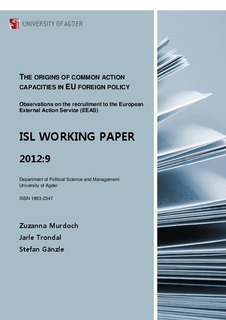THE ORIGINS OF COMMON ACTION CAPACITIES IN EU FOREIGN POLICY. Observations on the recruitment to the European External Action Service (EEAS)
Working paper
Permanent lenke
http://hdl.handle.net/11250/134918Utgivelsesdato
2012Metadata
Vis full innførselSamlinger
- ISL Working Papers [29]
Sammendrag
The Treaty of Lisbon introduced significant institutional changes for European Union’s (EU’s) external relations administration, notably the establishment of the European External Action Service (EEAS). Beside staff transferred from the Council Secretariat-General and the European Commission, the EEAS’ workforce is set to consist of approximately 33 per cent officials temporarily assigned from member-states by June 2013. This paper analyses to what extent and under what conditions the recruitment practice of member-state officials into EEAS is independent of government influence. The data draws on interviews with public officials from all 27 member-states as well as the EEAS charged with the selection of national public servants to the EEAS. Our findings suggest substantial independence in the recruitment of domestic government officials to the EEAS. We argue that this serves as a hard case of political order transformation since it happens in a policy field historically marked by national control and a lack of EU capacity. Independent recruitment of staff to the EEAS is facilitated under two conditions: (i) the supply of administrative capacities at EU level strengthen the EEAS’ capacity to nurture an independent recruitment of its personnel, and (ii) the recruitment of EEAS personnel is fashioned by pre-existing organisational traditions, practices and formats.
Beskrivelse
Presentation on department page: http://www.uia.no/no/portaler/om_universitetet/oekonomi_og_samfunnsvitenskap/statsvitenskap_og_ledelsesfag/ forskning_isl/isl_working_papers_series
